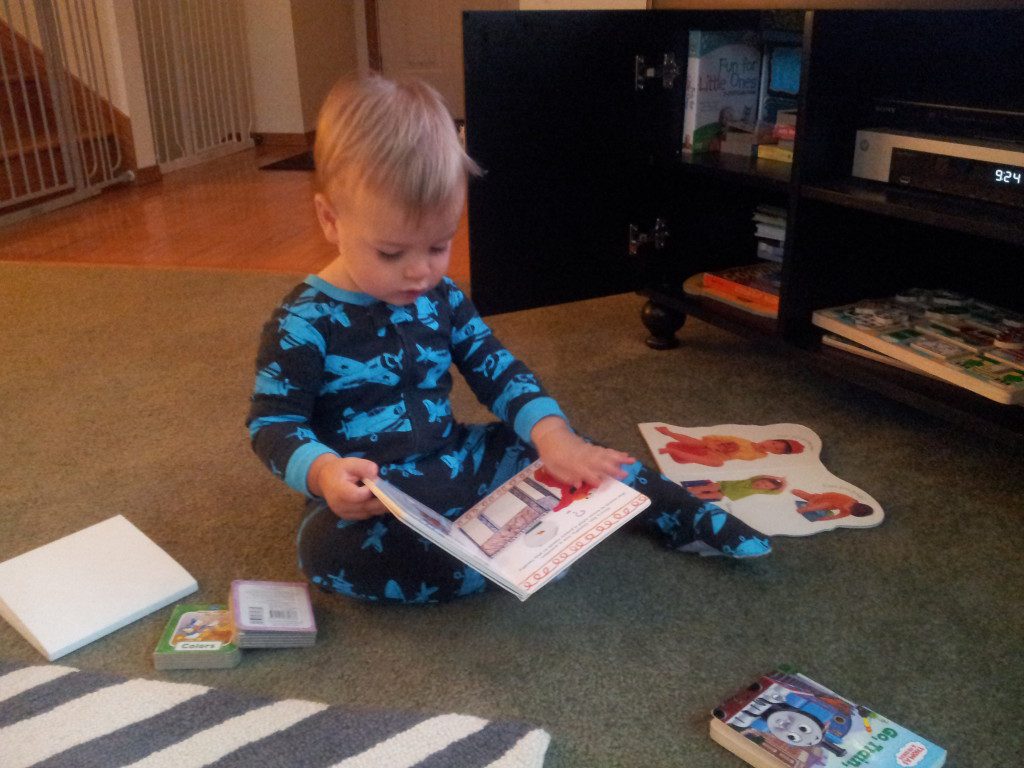A year ago, my son was about to turn 2 and had never said the word “Mama.”
Or “Dada.” Or “ball.” Or “up.” Mason was silent and stoic, and we were nervous.
 Our pediatrician frowned at the communication questionnaires I filled out and recommended speech therapy. I frantically Googled things like “2 year old won’t talk” and tried to ignore the voice in my head.
Our pediatrician frowned at the communication questionnaires I filled out and recommended speech therapy. I frantically Googled things like “2 year old won’t talk” and tried to ignore the voice in my head.
We did everything we could think of to get him talking. We talked and read to him constantly, we bought flashcards with bright pictures on them, we implemented ideas from the book our pediatrician recommended.
I remember being with Mason at the library and chatting with another mom, whose son was 9 months younger than mine and talking up a storm. I was so envious of their interactions. “You’re right, that is a ball! Yes, a blue ball!” When she asked how old my son was and I told her, she looked confused. (Or maybe I just imagined it.)
During a parent-teacher conference at Mason’s daycare, I saw two words on his development report that I’ll never forget. Under communication skills: “extremely delayed.” I went home in tears.
Today, Mason is a few months from his third birthday, and he’s a total chatterbox. His vocabulary includes hundreds of words–too many to count, and more every day. His pronunciation isn’t as sharp as some kids’, and his sentences aren’t quite as sophisticated, but you’d never guess that a year ago he was only babbling.
If you’re the mom of a quiet toddler: be encouraged.
We all know that every child is different, and that they all learn at their own pace–or at least, we “know” that–but those darned milestones have a way of shaking our faith. (Unless our kids are meeting them early, in which case: look how smart they are!)
And of course, we ALL have friends whose kids are doing things sooner/better/easier…
One thing I’ve learned is to to recognize when a behavior is more a reflection of my son’s personality than his development or my parenting. Even though he’s talking now, Mason is still a reserved kid by nature. It takes him awhile to warm up to new environments and new people, and until he does that, he’s quiet. (I know: not the worst thing in the world for a toddler!)
Oh, and we did get that speech therapist, for a few months. She was wonderful with Mason, but she helped me even more. She had complete confidence in my son, when my own was faltering, and she gave me things to do so I could feel like I was “helping.”
In the end, though: my son talked when he was ready. Not a second sooner.
If you’re the mom of a late talker, and you find yourself wanting to feel like you’re helping, here are a few ideas to try. (This is a mix of tips and tricks from our speech therapist and our own experiences–but as always, remember that every child responds to things differently!)
Get your child’s ears checked
I was extremely reluctant to do this, since Mason seemed to hear fine–he reacted to sounds, responded to his name, etc. But even a small amount of hearing loss can impair speech development. (I’ve read that it’s like being underwater–imagine trying to learn a foreign language that way!)
In the end, a visit to the audiologist did detect some hearing loss, and the doctor recommended ear tubes. Mason didn’t start speaking until several months after the tubes, so we’re not sure how much we can credit them with his progress, but we definitely didn’t regret getting them. (Bonus side effect: no ear infections!)
Figure out what motivates your child
This was our speech therapist’s very first piece of advice. The idea is to teach kids that communication helps them get things they want–it’s not just for pleasing Mom and Dad. So instead of encouraging them to talk just for the sake of talking (“can you say Mama?”), save the prompting for things they care about.
Food and drink are common motivators. If your child wants a drink, withhold the cup a little bit and see if he’ll say “milk” (or whatever) to get it.
Encourage interaction through sounds
Sounds are precursors to speech and a great place to start. Talking about animal sounds is perfect for this, especially if your child is into animals.
Our son was into one thing, and one thing only: cars. So, our speech therapist encouraged as much vroom-vrooming and beep-beeping as possible.
Let them finish
Mason’s first word was “go,” and we got him to say it by prompting him with the phrase “ready, set, go.” We started using the phrase while playing with his cars, and once we were sure he was familiar with it, we’d say “ready, set…” and then wait. We did this over and over and over, and eventually, it clicked.
This method works great with books too–especially rhyming ones. Once you’ve read the child the book several times, try pausing before the last word of an easy sentence to see if he’ll fill in the blank. We still do this all the time with Mason, and he loves the opportunities to participate.

Get the child’s attention
We were coached to come down to Mason’s eye level and wait until he looked at us to speak (when prompting him). It was amazing how often we weren’t taking the time for this simple step.
Wait longer than usual for responses
We noticed that if we gave Mason a prompt and he didn’t make an effort to respond right away, we’d keep repeating the prompt. “Up? Can you say up? Do you want up?” But the problem wasn’t that he hadn’t heard us.
Eventually, we learned to wait an uncomfortable amount of time after a prompt, to give him plenty of time to respond if he wanted to.
Keep the pressure off
Mason used to get (actually, still gets) stage fright if he felt like he was being put on the spot. Sometimes, when he’d be playing alone, I’d overhear him making car sounds and bud in with comments like, “that’s right, buddy, vroom-vroom!” When he’d realize I’d been listening, he’d look flustered and immediately clam up. #fail!
Make a personalized picture book
Mama and Dada are often kids’ first words because they’re easy to say. But for some kids, the in-their-face interaction that’s usually happening when they’re taught those words can be intimidating. It can be helpful to encourage speech while focusing on something else–like a book.
We got a blank board book, like this one, and filled it with pictures of my husband and I, as well as all of Mason’s favorite things: a car, a truck, Elmo, and Mickey, plus some easy-to-say words like dog and ball. He loved it!
Don’t let the milestone police get you down
In retrospect, I wish I wouldn’t have let my pediatrician’s concerns get to me so much. I understand the importance of early intervention in some cases, but my son wasn’t showing any other concerning signs, and I had so many people (including the speech therapist) assuring me he’d catch up. Why was I so focused on the worst case scenario?
My final tip (and this applies to basically anything parenting-related): whatever you do, beware of Google!
To mimic what I heard many, many times during that phase: hang in there, Mama. Before you know it, your kid will be talking your ear off, and you’ll look back with fondness on those sweet, silent days.













my daughter had speech delays and had speech therapy. She was diagnosed at 8 with high functioning Autism and Auditory Processing issues. If your child mis hears or mis pronouces a lot, get them checked for Auditory Processing Disorder.
Great article with great tips. Early intervention is the key as research has shown. One never knows going in whether it’s their personality or a true delay. Getting therapy is not a bad thing regardless of either. My daughter was diagnosed with delays and received early intervention starting at 2 years of age, she later was diagnosed with autism. She now is 20 and talks a mile a minute, yes she still has autism, but I attribute her huge gains and current successes to the wonderful therapist who got her started.
Beverly, what type of intervention did your daughter receive and was it covered by insurance?
Hi Kim, I’m Kim also with a 2 yrs old son Mason. Your article is giving me some hope. My son Mason only says about 10 words. I have an older son JOHN who is 5 and talks like an adult. About six months ago we were encouraged by her pediatrician to seek early intervention. Early intervention was denied stating that he was so active in trying to keep up with his older brother, that he was not interested in talking. So here we are six months later and I have not seen much improvement. Early intervention is coming back tomorrow to evaluate Mason and hopefully we can get him started on a program. I am sure by the time he is three he’ll be a chatterbox, but mothers should never doubt their intuition and seek every opportunity they can for their child.
This is so reassuring. I’m sure you don’t think so, but my son was born 8 weeks premature and we spent 19 days in the NICU. He was hitting all his milestones until about 1 according to the pedi questionnaire that you complete at visits. I began to work harder with him, but he was still behind. At his 2 year appointment his pedi said she can’t rule out austism and that he failed in all milestones. This was so heartbreaking to hear from someone that you trust with your child’s most vulnerable moments. I was so upset and cried and stressed for weeks about her comments. We want through the ECI evaluation where he passed everything. Our Pedi then called us back in because she felt that he still needed therapy services. We proceeded with the ear tube surgery and placed him in an awesome daycare rather than with a sitter and he is done phenomenal since February. He still isn’t where he needs to be, but it is improvement. It totally get the feeling of failure when my kid is not doing what other kids his age or younger are doing. This is a feeling that is hard to shake and I let it steal my joy sometimes. Thank you for posting this!
My friend sent me this article and I cried reading it. So much comfort reading what is exactly happening with our two year old. He just had tubes and adenoids out a week ago. Thank you for saying what has been on my mind. Also I could not agree more with the hearing assessment, he has failed twice and we go back in six weeks to see if he tubes improved things. We also do weekly speech therapy, sign language, etc. I can’t tell you how many times I’ve blamed myself wondering if I did something during pregnancy or didn’t give him as much attention because he is our second child. This quote especially especially spoke to me “One thing I’ve learned is to to recognize when a behavior is more a reflection of my son’s personality than his development or my parenting.” Thank you again.
I see by the majority of comments that I’m a bit late to this article ???? but I do want to thank you for writing it. I’m going through a similar experience with my fourth child; he is not where he should be speech-wise, and it’s stressful.
I understand that as moms we do not want to believe that something is wrong with our children, but speech delay is a sign that the nervous system and brain are not working properly.
I am a pediatric chiropractor in Georgia and we see a similar pattern in sensory/adhd/spectrum/anxiety kids. It starts with a stressful pregnancy then birth intervention and early warning signs are colic and severe reflux in infants. Next it turns into developmental delays and/or chronic ear infections. As they start to become 2,3,4,5 years old the anxiety/sensory/spectrum issues start to show up.
Our nervous systems develop the most in the first 2 years of life than the rest of our lives combined. So the more stress (chemical, physical, emotional) our children encounter at a young, developing age the more the nervous system get hardwired into sympathetic (fight or flight, protective/surivival) mode. When the nervous system is in a dominant protective/survival state, there is little time for rest, development, and growth.
There are natural options out there that your pediatrician wont tell you about or does not know about. It is not their fault as they just lack the education in that area.
Any moms reading this please visit https://thenationalwellnessfoundation.org/ and watch the video at the top of the page.
I hope moms read this with an open mind. I am not trying to mom shame, only to raise awareness and educate people on these things. I understand that no mom wants to think something is wrong with their child and sometimes we can justify why they are behind or that they will catch up, but it is a warning sign that things are not right with their brain and nervous system.
Thank you for this article Kim. My son just turned two and is not yet talking. (He is also a car/ truck fan!) The pediatrician is concerned… which now has me concerned. In the midst of my concern I really needed to hear this!
I am so happy that I saw this article! Even if it doesn’t curb my anxiety, at least I am not alone. At least someone else in my situation eventually got their child talking. My first born talked at 15 months and was way ahead of the game. Now, my second born is 21 months and only says “Mama” and on rare occasions, “Dada”. My very hungry all of the time, car motivated fella won’t say food names or car words for the life of it. Not yet anyway. I’m hoping that a few tips from this article and further persistence will pay off soon!
Has anyone else had this problem with a second born? Seems more common in first borns…
You have no idea what your post has done today. My 3 year old has achieved all developmental milestones and knows and recognizes almost everything. She says words out loud but doesn’t speak in full sentences, except “I want milk or anything else she might want to have” she can recite all her favorite poems and knows the names of her favorite cartoon characters but she isn’t communicating like the other 3 year olds ! But after reading your post I feel a sense of relief ! Maybe it’s true that all kids work at their own pace. My husband is reserved by nature, maybe she takes after him ????
Thank you so much for writing this post !